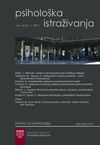Odnos vezanosti, mentalizacije i intelektualnih sposobnosti u adolescenciji
The Relationship between Attachment, Mentalization, and Intellectual Abilities in Adolescence
Author(s): Sonja Banjac, Ana Altaras-Dimitrijević, Aleksandar DimitrijevićSubject(s): Psychology
Published by: Филозофски факултет, Универзитет у Београду
Keywords: attachment; mentalization; intelligence/intellectual abilities; intellectual giftedness; adolescents;
Summary/Abstract: This paper explored the relationship between attachment, mentalization, and intelligence as it occurs in adolescence. Study participants were 345 students (123 males) in their third year of high school. Participants were administered three standard tests of intelligence, the SM-ECR-R, and the recently developed Mentalization Questionnaire (MQ). The study also utilized earlier collected data from a sample of 284 employed adults. In line with our research hypothesis, attachment security and mentalization were positively related, with correlations ranging from small to moderate depending on the dimension inspected. Attachment anxiety was found to be higher in the adolescent than in the adult sample, and contrary to expectations was not significantly related to intelligence in the former group. Attachment avoidance did not correlate with intelligence in the total student sample, but did show a small negative association with analogical reasoning and the g-factor when the intellectually gifted were excluded from analyses. This latter group, as well as males from the student sample scored significantly higher on attachment avoidance than their respective comparison groups – intellectually average and female adolescents. Finally, mentalization was found to be positively related to intellectual ability and higher in a) gifted than average-ability girls, b) girls than boys, and c) adults than adolescents. The results are discussed as shedding light on the peculiarities of the attachment system in adolescence, revealing specific associations between attachment avoidance, mentalization, and intellectual ability, highlighting gender differences in both attachment and mentalization, and adding to our understanding of the socioemotional characteristics of intellectually gifted students.
Journal: Psihološka istraživanja
- Issue Year: 16/2013
- Issue No: 2
- Page Range: 175-190
- Page Count: 16
- Language: Serbian

